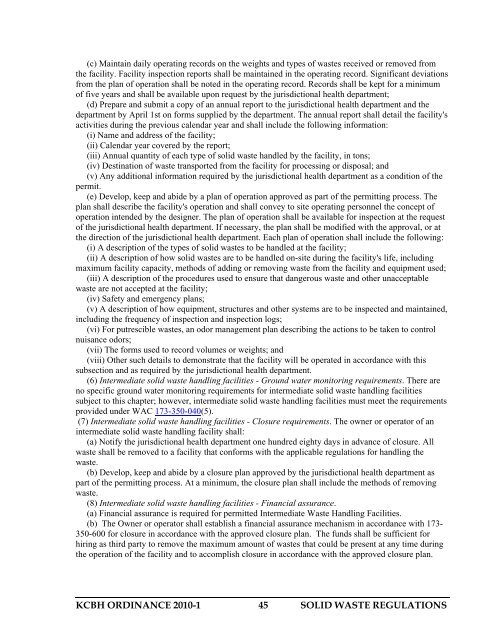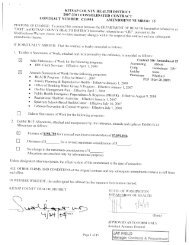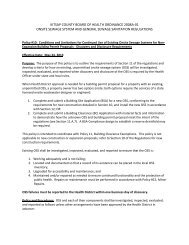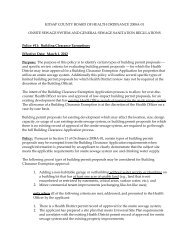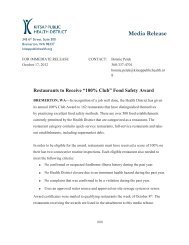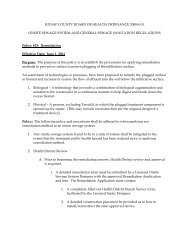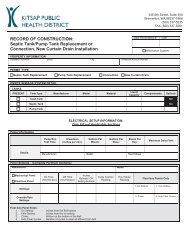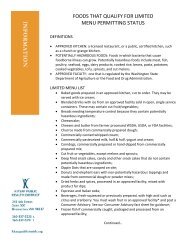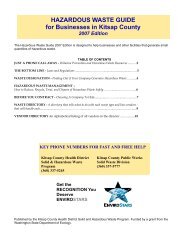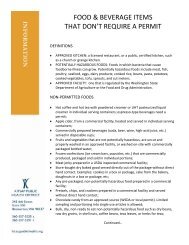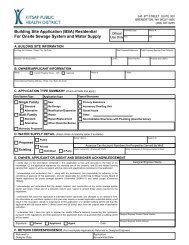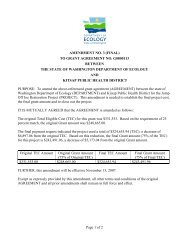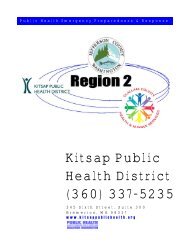SOLID WASTE REGULATIONS - Kitsap Public Health District
SOLID WASTE REGULATIONS - Kitsap Public Health District
SOLID WASTE REGULATIONS - Kitsap Public Health District
Create successful ePaper yourself
Turn your PDF publications into a flip-book with our unique Google optimized e-Paper software.
(c) Maintain daily operating records on the weights and types of wastes received or removed from<br />
the facility. Facility inspection reports shall be maintained in the operating record. Significant deviations<br />
from the plan of operation shall be noted in the operating record. Records shall be kept for a minimum<br />
of five years and shall be available upon request by the jurisdictional health department;<br />
(d) Prepare and submit a copy of an annual report to the jurisdictional health department and the<br />
department by April 1st on forms supplied by the department. The annual report shall detail the facility's<br />
activities during the previous calendar year and shall include the following information:<br />
(i) Name and address of the facility;<br />
(ii) Calendar year covered by the report;<br />
(iii) Annual quantity of each type of solid waste handled by the facility, in tons;<br />
(iv) Destination of waste transported from the facility for processing or disposal; and<br />
(v) Any additional information required by the jurisdictional health department as a condition of the<br />
permit.<br />
(e) Develop, keep and abide by a plan of operation approved as part of the permitting process. The<br />
plan shall describe the facility's operation and shall convey to site operating personnel the concept of<br />
operation intended by the designer. The plan of operation shall be available for inspection at the request<br />
of the jurisdictional health department. If necessary, the plan shall be modified with the approval, or at<br />
the direction of the jurisdictional health department. Each plan of operation shall include the following:<br />
(i) A description of the types of solid wastes to be handled at the facility;<br />
(ii) A description of how solid wastes are to be handled on-site during the facility's life, including<br />
maximum facility capacity, methods of adding or removing waste from the facility and equipment used;<br />
(iii) A description of the procedures used to ensure that dangerous waste and other unacceptable<br />
waste are not accepted at the facility;<br />
(iv) Safety and emergency plans;<br />
(v) A description of how equipment, structures and other systems are to be inspected and maintained,<br />
including the frequency of inspection and inspection logs;<br />
(vi) For putrescible wastes, an odor management plan describing the actions to be taken to control<br />
nuisance odors;<br />
(vii) The forms used to record volumes or weights; and<br />
(viii) Other such details to demonstrate that the facility will be operated in accordance with this<br />
subsection and as required by the jurisdictional health department.<br />
(6) Intermediate solid waste handling facilities - Ground water monitoring requirements. There are<br />
no specific ground water monitoring requirements for intermediate solid waste handling facilities<br />
subject to this chapter; however, intermediate solid waste handling facilities must meet the requirements<br />
provided under WAC 173-350-040(5).<br />
(7) Intermediate solid waste handling facilities - Closure requirements. The owner or operator of an<br />
intermediate solid waste handling facility shall:<br />
(a) Notify the jurisdictional health department one hundred eighty days in advance of closure. All<br />
waste shall be removed to a facility that conforms with the applicable regulations for handling the<br />
waste.<br />
(b) Develop, keep and abide by a closure plan approved by the jurisdictional health department as<br />
part of the permitting process. At a minimum, the closure plan shall include the methods of removing<br />
waste.<br />
(8) Intermediate solid waste handling facilities - Financial assurance.<br />
(a) Financial assurance is required for permitted Intermediate Waste Handling Facilities.<br />
(b) The Owner or operator shall establish a financial assurance mechanism in accordance with 173-<br />
350-600 for closure in accordance with the approved closure plan. The funds shall be sufficient for<br />
hiring as third party to remove the maximum amount of wastes that could be present at any time during<br />
the operation of the facility and to accomplish closure in accordance with the approved closure plan.<br />
KCBH ORDINANCE 2010-1 45 <strong>SOLID</strong> <strong>WASTE</strong> <strong>REGULATIONS</strong>


